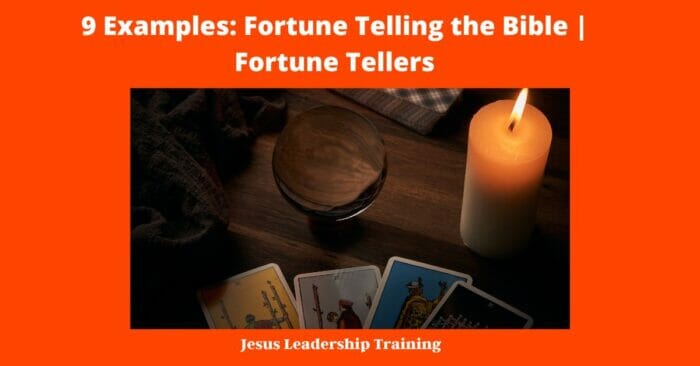Fortune Telling in the Bible – The Bible remains one of the most popular books in the world and its popularity is not waning. A big reason for this continued interest is its accuracy in predicting future events. Bible prophecy has been fulfilled with 100% accuracy thus far and there are many more predictions that will come to pass in the future.
This is not a coincidence or chance but rather evidence that God is real and that his Word can be trusted. As we read the news, it’s easy to feel like the world is spiraling out of control. But as believers, we can take comfort in knowing that God is still on his throne and he has a plan for our lives and for the world.
The Bible is not a book of fortune telling but it does give us a glimpse into God’s character and his plans for humanity. We may not understand everything that is happening in the world today but we can trust that God knows what he is doing and he will ultimately triumph over evil.
Table of Contents
History of Fortune Telling in the Bible
The history of fortune telling is as old as the Bible. Bible references to divination are numerous and include the use of rods, arrows, yarrow stalks, entrails, dice, and crystal balls. The prophet Balaam was said to have used a donkey’s jawbone to divine the will of God.
The Bible forbids divination and astrology (Leviticus 19:26,31; Deuteronomy 18:10-12), but does not preclude all forms of prediction. In fact, some biblical figures were known for their ability to foretell the future, such as Joseph (Genesis 41:8), Daniel (Daniel 2:27-28), and Elijah (1 Kings 18:19).
One of the most famous passages in the Bible involving divination is the story of King Nebuchadnezzar’s dream interpreted by Daniel (Daniel 2:1-48). In this story, Daniel accurately predicts that Nebuchadnezzar will become king and that he will conquer many nations. Nebuchadnezzar rewards Daniel by making him second in rank only to himself.

Another significant biblical reference to fortune telling is found in the Book of Revelation. In this apocalyptic book, John records a vision in which he sees “a woman sitting on a scarlet beast” with “seven heads and ten horns” (Revelation 17:3). This woman is often interpreted as a symbol of evil, and her association with the number seven has been linked with divination and other forms of black magic
What is fortune telling?
Fortune telling is a centuries-old practice that still has a place in modern society. The basic premise of fortune telling is predicting information about a person’s life. This can be done through various means, such as tarot cards, astrology, or crystal balls. There is no one right way to do fortune telling; each practitioner may have their own methods and tools that they use.
See Amazons Resources on Educational Books on Fortune Telling
Some people believe that fortune telling is akin to divination and that there are spiritual forces at work behind the predictions. Others see it as more of an advisory practice, where the fortune teller can offer suggestions and affirmations to help the person make better choices in their life. Regardless of how it is seen, fortune telling is an interesting and often fun practice that can provide insights into our lives.
Is Fortune Telling Biblical?
Fortune telling is not biblical. The Bible forbids divination (Deuteronomy 18:10-12), and this is the essence of fortune telling. There are numerous other reasons why fortune telling is not biblical. First, fortune telling typically involves invoking evil spirits or demons to help make predictions.
This is explicitly forbidden in the Bible (Leviticus 19:31). Second, fortune telling often encourages people to place their trust in something other than God for guidance and wisdom. The Bible teaches that we should only seek God’s guidance ( place of Prayer) (Proverbs 3:5-6).
Finally, fortune telling often leads to superstition and a lack of faith. The Bible tells us that God controls the future, and we do not need to worry about it (Matthew 6:25-34). We Find His answers to have much gain, by following the word of the lord, in the sight of the lord.
7 Types of Divination in the Bible
1. Astrology: the study of the movements and placement of celestial bodies in order to predict future events or gain insight into human behavior.
2. Bibliomancy: divination by books, often using scriptures or other religious texts.
3. Cartomancy: divination by cards, usually tarot or oracle cards. Palm Readings, speaking with familiar spirits,
4. Chiromancy: divination by the shape of hands and lines on the palms.
5. Clairvoyance: perceiving objects or events beyond the natural range of vision.
6. Cleromancy: divination by casting lots or casting bones or stones.
7. Chronomancy: divination by determination of lucky and unlucky days.

List of 9 scriptures on the Bible Describing Some Form of Fortune Telling
1. Ezekiel 21:21-“For the king of Babylon stands at the parting of the way, at the head of the two ways, to use divination; he shakes the arrows.”
2. Leviticus 19:26-“Do not practice fortune-telling or sorcery.”
3. Deuteronomy 18:10-“There shall not be found among you anyone who practices witchcraft, or a soothsayer, or one who interprets omens, or a sorcerer,”
4. Isaiah 47:12-“Stand now with your enchantments and with your many sorceries, which you have labored to practice from your youth; perhaps you will be able to profit, perhaps you will prevail.”
5. Daniel 2:27-“The king answered Daniel and said, ‘Surely your God is a God of gods and a Lord of kings and a revealer of mysteries, for you have been able to reveal this mystery.'”
6. Acts 16:16-“Now it happened, as we went to prayer, that a certain slave girl possessed with a spirit of divination met us, who brought her masters much profit by fortune-telling.”
7. Luke 21:25-“And there will be signs in the sun, in the moon, and in the stars; and on the earth distress of nations, with perplexity, the sea and the waves roaring;”
8. 1 Corinthians 14:2-“For he who speaks in a tongue does not speak to men but to God; for no one understands him, but he utters mysteries in the Spirit.”
9. Revelation 21:8-“But the cowardly, unbelieving, abominable, murderers, sexually immoral, sorcerers, idolaters and all liars shall have their part in the lake which burns with fire and brimstone, which is the second death.”
Rituals Associated with Divination in the Bible
There are many instances in the Bible where people use divination to try and seek guidance from God or learn about the future. Prophets often used divination, as did King Saul when he consulted the witch of Endor (1 Samuel 28:7-20). The most famous example is probably when Joseph interpreted Pharoah’s dreams using divination (Genesis 41:25-36).
Divination was also sometimes used for more mundane purposes, such as when Eli’s sons used it to determine how to divide the sacrifices between them (1 Samuel 2:27-36). However, it was generally discouraged by the biblical authors and seen as an illegitimate way of trying to gain knowledge. In the New Testament, Paul even lists divination as one of the things that will keep people from inheriting the kingdom of God (Galatians 5:19-21).
There are many different rituals associated with divination in the Bible. The most common is probably the use of the Urim and Thummim, which were two stone discs used to interpret messages from God. Other forms of divination mentioned in the Bible include dream interpretation, bird watching, and interpreting the patterns made by oil lamps.
Each of these methods was used in order to gain insight into the future or to obtain guidance from God. While some people may view divination as superstitious, there is no doubt that it was a significant part of ancient Near Eastern life and culture.

The History of Divination in the Bible
There are many instances of divination in the Bible, most famously when Sardechrizzar used it to predict the future from Daniel’s interpretation of his dream (Daniel 2:27). Other prophets, such as Ezekiel and Isaiah, also practiced divination and were able to give accurate predictions about future events.
The Bible doesn’t explicitly condemn divination, but it does warn against false prophets who use it to deceive people. In general, the Bible seems to approve of using divination for good purposes, such as seeking God’s will for a particular situation.
Even though we don’t often think of it as such, prayer can be seen as a form of divination. We ask God for guidance and then wait for him to reveal his will to us, either through the Bible or through circumstances. When we do this, we need to be careful that we don’t let our own desires distort what God is saying to us.
Today’s Use of Divination and Christianity
Divination is the practice of discovering hidden knowledge or future events using supernatural means. For centuries, people have used divination to commune with the divine, gain insight into the future, and understand the will of the gods. Today, divination is often seen as a fascinating curiosity, but it is also still practiced by many people around the world.
While divination has been practiced by cultures across the globe, it has also been denounced by some religions, including Christianity. In the Bible, divination is repeatedly condemned as a rebellion against God (Deuteronomy 18:9-12; Isaiah 8:19).
Christians are called to instead trust in God’s providence and seek guidance from his Word. However, despite this biblical admonition, many Christians still practice divination today. Some use it to find comfort in difficult times or to make decisions about important life choices.
The use of divination is strictly forbidden in Christianity. Divination is the practice of seeking knowledge of the future or the unknown by supernatural means. It is considered to be a form of witchcraft, and it is an abomination to God. The Bible is very clear about this:
There shall not be found among you anyone who makes his son or his daughter pass through the fire, one who uses divination, one who practices witchcraft, or one who interprets omens, or a sorcerer, or one who casts spells, or a medium, or a spiritist, or one who calls up the dead. For whoever does these things is detestable to the Lord” (Deuteronomy 18:10-12). Christians are to have nothing to do with divination in any form. We are to trust in God alone for our future and seek His will for our lives.
The Role of Divination in Spiritual Growth
Although divination is strictly forbidden in Christianity, there is still a role for it in spiritual growth. In order to grow spiritually, we need to develop a relationship with God. This involves spending time with Him in prayer and studying His Word. It also involves listening to what He is telling us through the Holy Spirit. In addition, we need to be willing to obey Him.
Using Divination for Guidance
Some Christians may feel tempted to use divination as a way to seek guidance for their lives. However, this is not advisable. Divination is not a reliable source of information, and it can be dangerous to rely on it. God alone should be our source of guidance in our lives. We should pray for His guidance and direction, and we should trust in Him for the future.
5 Risks of Divination
Are you thinking of trying divination? Here are some of the risks you need to consider:
1. Divination is a form of witchcraft and is an abomination to God. It is forbidden in Christianity.
2. Divination is not a reliable way to get information about the future or the unknown. The outcomes are often inaccurate and can be dangerous.
3. Divination can be addictive and lead to further spiritual destruction. It can also be used for evil purposes by demonic beings.
4. Divination is often associated with other forms of occult activity, which can be harmful and even dangerous. Can be a source of much evil, looking for insight in the name of other gods.
5. If you choose to engage in divination, you run the risk of opening yourself up to spiritual attack and deception. The activity of cast spells, following demonic spirits, and looking for the dead on behalf of the living.. Looking for a large profit
Final Thoughts – Fortune Telling in the Bible
In summary, divination is a dangerous practice that is strictly forbidden in Christianity. It is not a reliable source of information and can lead to spiritual destruction. If you are considering trying it, I urge you to reconsider. Seek God’s guidance for your life and trust in Him alone for the future. He is our only hope and our sure foundation. Servants of the Most High God,
seek his guidance in the name of Jesus Christ pointing toward the way of salvation. It Opposes Bible verses and the spirit of God
God Bless Greg
Best Bible Encyclopedias and Dictionaries
Below is a table featuring some highly regarded Bible Encyclopedias and Dictionaries along with their publishers and websites where they can be found or purchased.
| Title | Publisher | Website |
|---|---|---|
| The International Standard Bible Encyclopedia | Eerdmans | Eerdmans |
| Zondervan’s Pictorial Bible Dictionary | Zondervan | Zondervan |
| Easton’s Bible Dictionary | Thomas Nelson | Thomas Nelson |
| Holman Illustrated Bible Dictionary | B&H Publishing Group | B&H Publishing Group |
| The New Unger’s Bible Dictionary | Moody Publishers | Moody Publishers |
| HarperCollins Bible Dictionary | HarperOne | HarperOne |
| Vine’s Complete Expository Dictionary of Old and New Testament Words | Thomas Nelson | Thomas Nelson |
You can generally find these resources on the publishers’ websites, as well as other online book retailers such as Amazon or Christianbook. It’s always good practice to confirm availability and review additional details on the specific websites or other reliable online bookstores.




